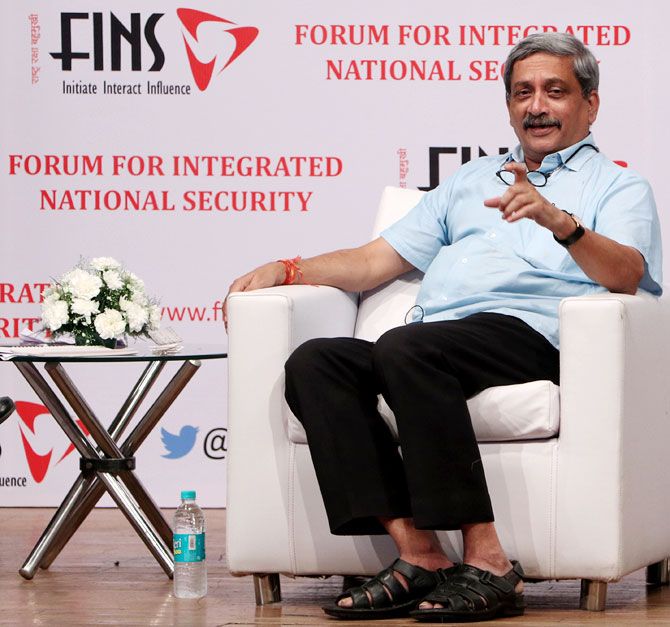'Everyone should realise it is the government which takes decisions and that government needs to be cheered for the decision which we took boldly.'
Rediff.com's Prasanna D Zore reports.

For the very first time, Raksha Mantri Manohar Parrikar, a senior member of Narendra Modi's Cabinet, openly said on Wednesday, October 12, that the people who took the political decisions for conducting the September 29 surgical strikes should reap the profits of that decision.
Agar koi galti hoti toh uska pura jo kuch aana tha wah isi sarkar ke sir pe aata tha (had there been any mistakes/casualties this government would have had to face the negative political fallout)," Parrikar said, justifying why the political credit for taking the decision should go to Prime Minister Narendra Modi and his government.
"We don't take credit for the surgical strikes (as in the military operation of crossing the Line of Control and eliminating terrorists). That credit entirely belongs to the Indian armed forces," Parrikar said.
"But I think everyone should realise that it is the government which takes decisions and that government needs to be cheered for the decision which we took boldly," the defence minister added, clearly demarcating the difference between the military operations undertaken by the Indian Army and the political decision that gave the army a free hand.
Revealing the mood among the decision makers that night who, according to some newspaper reports, watched the entire operation live, Parrikar said, "I could hardly sleep on the 28th night and 29th morning (the surgical strikes were conducted on the intervening night of September 28-29) until the news was received that everyone is safe and back. Possibly that was the most tiring and tense days for all of us."
"I think those who have taken decisions need to be definitely credited with it," he said. "People in this country are smart. They don't have to be told about political voting and other election things."
"The national mood is clear and therefore the political... So, those who would have suffered losses I think they are the ones who should also reap profit out of the (political) decisions, not of the (surgical) strike, but guts to take the decision. The government takes decision (to give a free hand to the armed forces) and the government needs to be cheered for taking decisions boldly."
Taking a jibe at the Bharatiya Janata Party's political opponents, Parrikar said when the Indian armed forces had crossed India's eastern border and entered Myanmar to conduct a surgical strike against insurgents who were hiding in that country after killing 18 soldiers of India's 6 Dogra regiment, Parrikar said, "some people had dared us asking if this government has the political will to conduct such similar strikes across India's western border."
The raksha mantri was speaking at a seminar Strengthening India's Defence Capabilities, organised by the Forum for Integrated National Security, and anchored by Rediff.com columnist Nitin Gokhale, founder, BharatShakti.in
Earlier in his 30-minute address, taking on the media, Parrikar said, "With this the media should be clear, and I quote, '127 crore Indians and India's armed forces deserve the credit for surgical strikes. Your contribution is 1/127 crore. My contribution is also 1/127 crore.'"
During the question and answer session with the audience, Parrikar was categorical -- again a first from a top minister in the Modi Cabinet -- that not a single 'surgical strike' was carried out by the Indian armed forces before the one sanctioned by his government on September 29, 2016.
"There was a burden of helplessness and frustration among 127 crore Indians and 13.5 lakh Indian soldiers. There was frustration that the enemy is continuously bleeding us through 1,000 cuts. The same people expressed joy when surgical strikes were conducted," he said.
Praising Modi's leadership, Parrikar said the prime minister tried his best to have good relations with Pakistan, but that was construed as India's weakness.
"The surgical strikes have changed the mindsets of India's people and a message has gone to our adversaries that such attacks will not be tolerated," he said.
Elaborating on his government's strategic shift in dealing with Pakistan and the non-State actors that it supports, Parrikar added, "earlier they predicted India's predictability. But the surgical strikes have made them realise that India's response can be unpredictable."
"Next response (in the event of an attack like the ones in Pathankot and Uri) may not be a surgical strike. India's unpredictability is a very big weapon now."










